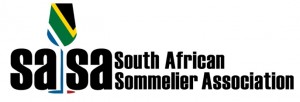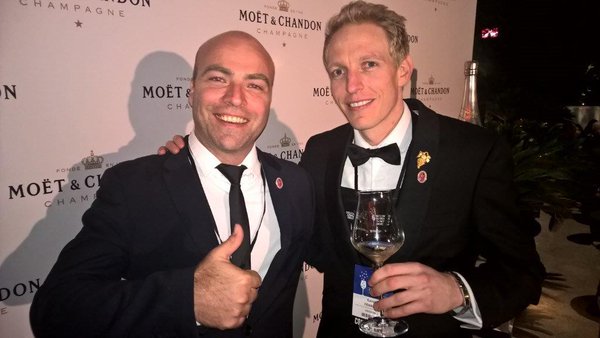The sommelier in South Africa
South Africa, in general, and the Cape in particular, is recognised for its excellent restaurants, food and wine. There are regular dispatches from foreign media praising (often with surprise) such excellence. This is also reflected in the many awards received.
If there’s one aspect of our dining and wining scene that hasn’t kept pace, it’s in wine service. The role of the sommelier or even wine steward has been insufficiently appreciated or understood. Things are changing, however, thanks to the enthusiasm and energy of the group behind the South African Sommelier Association (SASA).

Current chair Higgo Jacobs outlines what the association has achieved since it was founded in 2010, the difficulties it encounters and its long term goals. Membership is spread over several categories, including ‘Enthusiast’ (I’m one of those), of which there are around 70, a similar number of corporate members and a further 100 professionals.
“SASA set out to create awareness in the industry about the role of the sommelier in hospitality and the wine industry at large. How having a properly trained and qualified professional as part of your front-of-house team will add value to the restaurant experience and improve beverage revenue. We also wanted to create a platform for networking between sommeliers working locally and visiting from abroad.”
These goals, Jacobs believes, have been achieved. Education is the next objective. “Two levels of sommelier training have been launched in the past 12 months – one, our own SASA certification for a qualified sommelier, the other an introduction to sommelierie.”
Jacobs adds that both have graduates and bursaries, thanks to industry support, are offered.
It should be borne in mind that as an NPO the body is membership funded and, with the seven-member executive offering their time voluntarily, their achievements so far should be applauded.
Plans for the long-term are even more ambitious. Jacobs explains: “The industry is looking to us to provide proper education and training for sommeliers in South Africa. Putting everything in place to achieve this, with the high standards that SASA has become known for, is no small feat. We would like to build on this, helping to play a part in creating skilful storytellers to promote the fantastic South African wine, food and tourism.”
There are many reasons why it’s taken so long for attention to be paid to proper, professional wine service. Jacobs outlines some major ones: ‘It's tied in with cultural timing of awareness and expectations in hospitality. Until recently our wines have not been highly regarded worldwide and, as recently as 10 years ago, upmarket establishments could get away with serving a stale croissant and bad coffee. A rising tide lifts all boats...”
And how it’s changing: “There is more competition for good sommelier positions now; also more establishments identifying and budgeting for a sommelier.”
Gareth Ferreira is a South African sommelier currently plying his trade at the new and prestigious Club 67 Pall Mall in the UK. He remarkably achieved a place in the top 15 of this year’s Sommelier of the World, held in Argentina.

Higgo Jacobs and Gareth Ferreira
Ferreira didn’t grow up with wine in the household but after graduating with a Tourism Diploma he gained practical training in hotels and restaurants, which is where his wine journey began.
As someone who has worked as a sommelier both in South Africa and the UK, what does Ferreira see as the main differences? “Basically, the availability of wines from around the world in the UK, which does make constructing a good wine list more difficult as it can be tricky to find balance between classic wines and regions, and the more obscure. Of course, it’s so much easier and less expensive to visit the European wine regions from the UK than South Africa.”
I think many South Africans associate a sommelier with fine dining establishments but are there opportunities in other types of restaurants? Ferreira believes so: ‘Absolutely; in less formal establishments a sommelier’s responsibilities could include restaurant management. More casual settings such as tapas and wine bars can be very exciting places for sommeliers, with small wine lists which change often and are well priced.’
On the export market, South African wines are making good gains on restaurant wine lists, something Ferreira thinks we should be pushing for. “In the important UK market, we’re seeing top South African wines listed on more and more restaurant wine lists. They offer great value, something sommeliers worldwide are starting to realise.”
Getting the wines on to a list is one thing but what styles are pairing well generally with food? Ferreira’s of the opinion that it is “fresher wines with moderate alcohol and good, fresh acidity. These wines seem to cut heavier dishes and complement lighter ones really well, depending on the season.”
As a sommelier who not only won this year’s Best South African Sommelier competition but went on to get into the top 15 in the world, I wondered whether such competitions have a purpose other than the prestige that comes with winning. “Competitions put you out of your comfort zone and force you to prepare for and study certain countries and regions you may not necessarily come across every day. They’re also a great networking opportunity, leading to industry friendships with those you’ve competed against.”
Today’s sommelier is a very different breed from even a few years’ ago, when they were looked on as intimidating and supercilious. I asked both Jacobs and Ferreira what are the most important characteristics in a sommelier. For Jacobs these would include: “A love of wine, people, food and creating experiences but also stamina, business sense and, especially in South Africa, patience and humility.” Ferreira also acknowledges humility “…with knowledge of wine. But the role of a sommelier these days involves much more than writing a wine list: stock control, inventories, ordering, receiving, staff management skills and generally making sure the beverage programme is efficient, unique and profitable. On the floor, of course, the most important thing is customer satisfaction.”
****
SASA will be involved with the WOSA Sommelier World Cup to be held in Cape Town in September 2016.
– Angela Lloyd